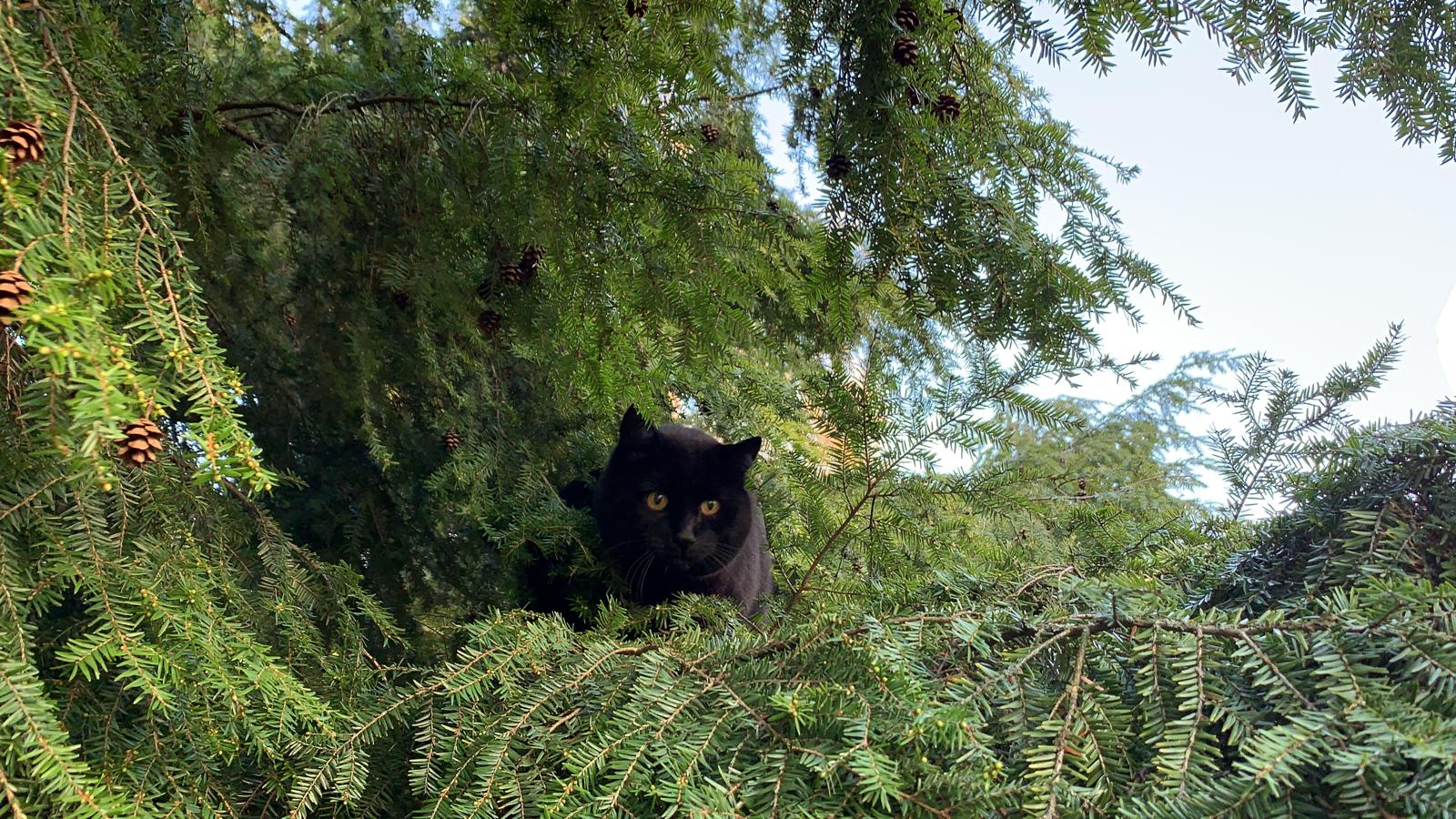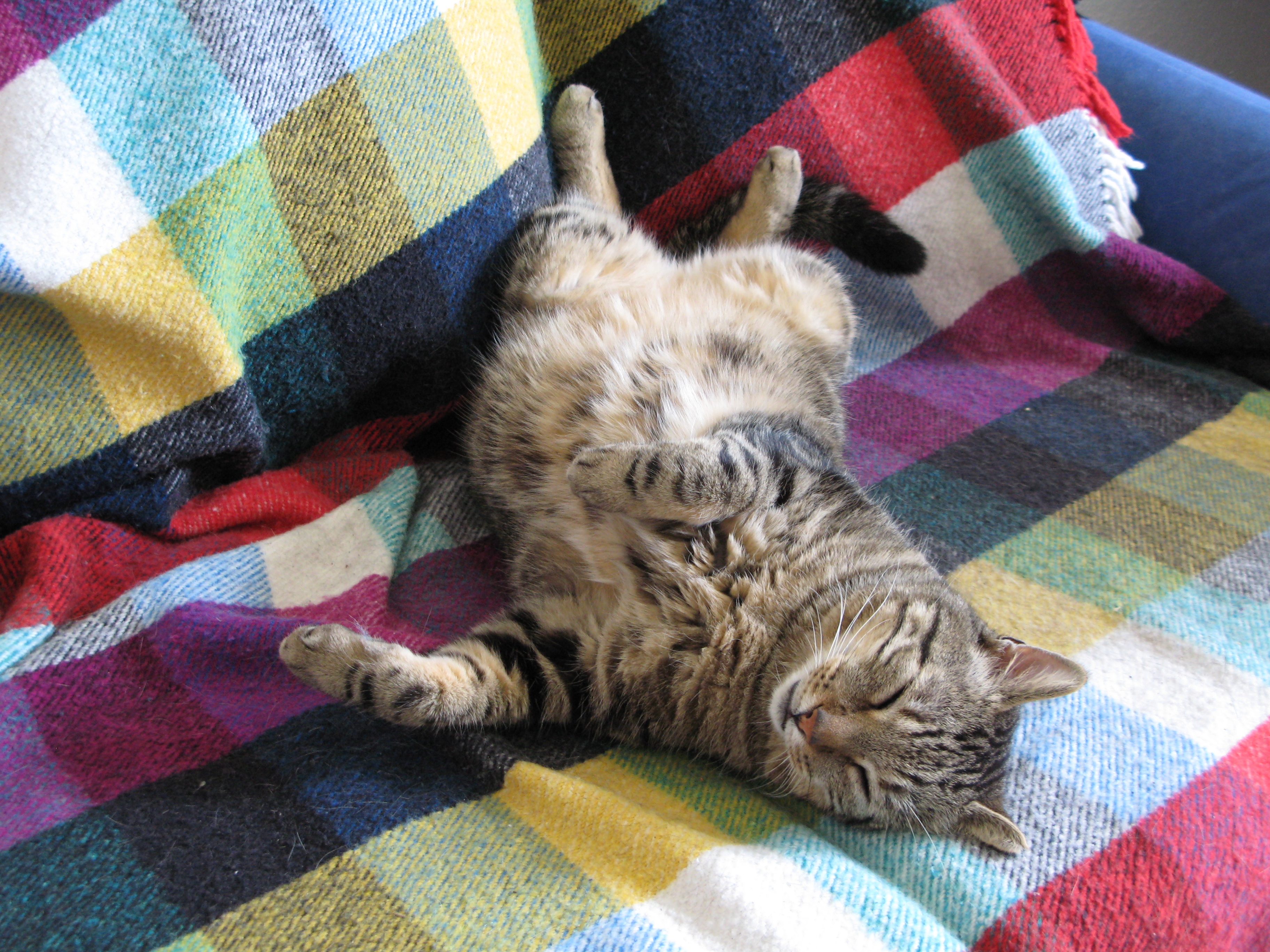Feline felons: what to do with Switzerland’s killer cats?

Cats kill millions of birds, frogs and other animals every year in Switzerland, but most politicians are reluctant to do anything about it. Would a “cat moratorium”, banning the importing and breeding of cats for ten years, make a difference?
Rats, bats, birds, voles, lizards and slow worms – these are some of the offerings, in various degrees of life, my wife and I have had to deal with over the years thanks to Sam. Given that a third of Swiss bird species are endangered, a higher proportion than in many other countries, environmentalists are now calling for something to be done to curb the Swiss cat population and reduce the threat to biodiversity.
Around two million cats prowl around Switzerland (human population nine million), of whom around a tenth are homeless and feral, estimates the Tier im RechtExternal link animal rights foundation. These cats, most of whom have access to the outdoors, provide companionship and pleasure for millions of people. They also kill about 30 million birds and half a million reptiles and amphibians in Switzerland every year, according to the newspaper Neue Zürcher ZeitungExternal link (NZZ).

More
Playing cats and ladders in Switzerland
The Swiss Climate Protection Association (Klimaschutz Schweiz) has now entered the debate and has started collecting ideas for a climate initiative. One of the ideas put forward at a recent meeting, which it admits focuses more on biodiversity than the climate, was a ten-year moratorium on importing and breeding cats.
Nature conservation organisation Pro Natura has also been thinking about the delicate issue. “You could make them wear collars that make a noise, keep them indoors for a few weeks during the main [bird] breeding season – but this would be difficult to implement – or consistently neuter outdoor cats to limit their hunting instinct,” Pro Natura director Urs Leugger-Eggimann told the NZZ.
In my experience, putting a bell around our black cat’s neck just honed his already good hunting skills and turned him into a lethal ninja, and house arrest would be miserable for everyone. But that hasn’t stopped the German town of Walldorf.
Cats in Walldorf aren’t allowed outside off a lead from the beginning of April to the end of August. This measure, currently in place for 2023, 2024 and 2025, is to protect the ground-nesting crested lark, which is facing extinction. Cat owners face fines of €500External link (CHF470) if their cat is caught outside – and up to €50,000 if a lark is injured or killed.
Unsurprisingly, many cat owners in Walldorf – not to mention cats – are unimpressed. “My cat Tchaikovsky comes from a farm. He’ll go bananas if I don’t let him out,” one resident told German tabloid BildExternal link last year. “Anyway, he’s much too lazy to go hunting.”

More
Is your pet happy?
Free movement of cats
Around 44% of households in the EUExternal link have a pet and the number is unlikely to be wildly different in non-EU Switzerland. For its part, the EU has saidExternal link it is “a strong defender of free movement rights – including of cats” and has “categorically” denied it would ever force cats to be kept indoors or on a lead.
Whereas 70% of cat owners in the United States, mainly concerned by coyotes and traffic, now keep their cats inside (up from 35% in the late 1990s), in the UK about 70% of owners let their cats out, a similar percentage to other European countries. “Access to the great outdoors is considered good for cats’ wellbeing, a position shared by [British] charities such as Cats Protection and Battersea Dogs & Cats Home, and there are few predators to worry about,” the Guardian reportedExternal link.

Putting things in perspective, Pro Natura director Urs Leugger-Eggimann stressed that cats are not the greatest threat to biodiversity. “Climate change, the expansion of settlement areas and the intensive use of agriculture are much more problematic,” he said.
Death threats
Despite the challenges, other tentative attempts have been made to curb the cat population in Switzerland.
In Aargau, Thomas Baumann from the Green Party called for cats and dogs to be treated equally: cat chips and registration should be mandatory, he said. He hoped the cost of chipping – about CHF100 ($118) – would reduce the number of cats “bought on a whim”, the Aargauer Zeitung reported in MarchExternal link.
“Anyone who is tired of a pet cat can abandon it at any time without being held responsible,” said Baumann, a bio farmer. Problems related to stray cats are becoming worse, he said. These include feline fights over territory and human demand for greater protection of biodiversity. “There are increasing calls for politicians to tackle this issue.”

More
Swiss ‘biodiversity initiative’: extreme or essential for protecting nature?
Some politicians are indeed putting on their armour and stepping up. In the city of Bern, Thomas Hofstetter from the Radical-Liberal Party proposed the introduction of a fee for outdoor cats. “A fee would be the most effective,” he told the NZZ. “On the one hand, it would raise the barriers to owning a cat, and on the other, the revenue generated could be used to protect biodiversity in accordance with the polluter-pays principle.”
However, as the Aargauer Zeitung noted with considerable understatement, “the issue is polarising”.
In 2013, researchers looked into how many birds were killed by cats in the US every year. Their findingsExternal link – up to four billion (mostly killed by feral cats) – certainly “ruffled fur and feathers”, as the National Geographic put itExternal link. “Media reports pitched cat people against bird people, animal rights advocates against ecologists, and pet owners against academics,” it said. “One of the researchers cowrote a book, Cat Wars – which didn’t exactly smooth things over – and described receiving death threats”.
‘Nobody wants to get burnt’
That cats represent a danger to certain wildlife doesn’t seem an extreme argument. Everyone knows that cats are predators. But Swiss politicians – possibly aware that almost half of households in the country have a pet – understandably seem reluctant to be seen as anti-cat.
For example, the city of Bern’s guide to biodiversityExternal link has unambiguous advice: “Don’t get a house cat.” The NZZ notes that in response to Thomas Hofstetter’s initiative, the Bern city government said requiring cats to wear a lead and banning outdoor cats would be effective measures – yet it doesn’t want to make any binding requirements. It’s “hard to imagine” that the measures would be “socially accepted”, it said. After all, cats are “people’s companions”.
“It’s fascinating,” Hofstetter said. “Nobody wants to get burnt on this topic. Cats are simply too popular.”

More
Animal lovers question morality of eating pets
Edited by Samuel Jaberg/ds
More

In compliance with the JTI standards
More: SWI swissinfo.ch certified by the Journalism Trust Initiative










You can find an overview of ongoing debates with our journalists here . Please join us!
If you want to start a conversation about a topic raised in this article or want to report factual errors, email us at english@swissinfo.ch.